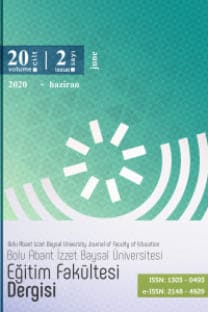ÖĞRENCİ VE ÖĞRETMENLERİN GÖZÜNDEN YÜKSEKÖĞRETİMDE DİL ÖĞRENİMİNDE ÖĞRENEN ÖZERKLİĞİNİN İNCELENMESİ
Autonomy, Learner Autonomy, Language Learning, Tertiary Education, English as a Foreign Language
AN INVESTIGATION OF LEARNER AUTONOMY IN LANGUAGE LEARNING IN TERTIARY EDUCATION: FROM THE PERCEPTIONS OF STUDENTS AND TEACHERS
autonomy, learner autonomy, language learning, language teaching,
___
- Alibakhshi, G. (2015). Challenges in promoting EFL learners' autonomy: Iranian EFL teachers’ perspectives. Issues in Language Teaching (ILT), 4 (1), 79-98.
- Allford, D., & Pachler, N. (2007). Language, autonomy and the new learning environments. Bern: Peter Lang.
- Benson, P. (1997). The philosophy and politics of learner autonomy. In P. Benson, & P. Voller (Eds.), Autonomy and independence in language learning (pp.18-34). London: Longman.
- Benson, P., & Voller, P. (Eds.). (1997). Autonomy and independence in language learning. London: Longman.
- Benson, P. (2006). Autonomy in language teaching and learning. Language Teaching, 40, 21-40. http://dx.doi.org/10.1017/S0261444806003958
- Benson, P. (2011). Teaching and researching: Autonomy. London: Longman.
- Broady, E., & K, Marie-Madeleine. (Eds.). (1996). Promoting learner autonomy in university language teaching. London: Middlesex University Printing Services.
- Creswell, John W. 2013. Qualitative inquiry and research design. Choosing Among Five Approaches. Washington DC: Sage.
- Cotterall, S. (1995). Developing a course strategy for learner autonomy. ELT Journal, 49(3), 219-227.
- Gardner, D., & Miller, L. (2002). Establishing self-access: From theory to practice. Shanghai: Shanghai Foreign Language Education Press
- Gremmo, M-J., & Riley, P. (1995). Autonomy, self-direction and self-access in language teaching and learning: The history of an idea, System, 23(2), 151-164.
- Han, L. (2014). Teacher’s role in developing learner autonomy: A Literature review. International Journal of English Language Teaching, 1(2), 21-27.
- Hedge, T. (2000). Teaching and learning in the language classroom. Oxford: OUP.
- Holden, B., & Usuki, M. (1999). Learner autonomy in language learning: A preliminary investigation. Bulletin of Hokuriku University, 23, 191–203.
- Holec, H., 1981: Autonomy and foreign language learning. Oxford: Pergamon. (First published 1979, Strasbourg: Council of Europe).
- Johnson, R. B., & Onwuegbuzie, A. J. (2004). Mixed methods research: A research paradigm whose time has come. Educational researcher, 33(7), 14-26. 65.
- Joshi, K.R. (2011). Learner perception and teacher beliefs about learner autonomy in language learning. Journal of NELTA, 16, 13-29.
- Kessler, G. (2009). Student-initiated attention to form in wiki-based collaborative writing. Language Learning & Technology, 13(1), 79-95.
- Knaldre, H. (2015). A qualitative document analysis of two Norwegian national curriculua (Master’s thesis). University of Bergen, Bergen, Norway.
- Knowles, M. (1975). Self-directed learning: A guide for learners and teachers. Chicago: Association Press.
- Lamb, T. & Reinders, H. (Eds.). (2008). Learner and teacher autonomy: Concepts, realities, and responses. Amsterdam/Philadelphia: Benjamins.
- Le, Quynh X. (2013). Fostering learner autonomy in language learning in tertiary education: an intervention study of university students in Hochiminh City, Vietnam (Doctoral dissertation). University of Nottingham, Nottingham, UK.
- Lincoln, Y. S., & Guba, E. G. (1985). Naturalistic Inquiry. Newbury Park, CA: Sage Publications.
- Little, D. (1995). Learning as dialogue: The dependence of learner autonomy on teacher autonomy. System, 23(2), 175-181.
- Little, D. (2000).We’re all in it together: Exploring the interdependence of teacher and learner autonomy. Paper presented at Autonomy 2000, University of Helsinki Language Centre, 7-9.
- Littlewood, W. (1996). Autonomy: an anatomy and a framework. System, 24(4), 427-435.
- Merriam, S. B. (1998). Qualitative research and case study applications in education. San Francisco: Jossey-Bass.
- Phan, T. T. T. (2012). Teacher autonomy and learner autonomy: An east asian’s perspective. International Journal of Social Science and Humanity. 2(6), 468-471.
- Seeman, T., & Tavares, C. (2000). Involving learners in their own learning: How to get started. Focus on learning rather than teaching: Why and how, 59-70.
- Shahsavari, S. (2014). Efficiency, feasibility and desirability of learner autonomy based on learners’ and teachers’ point of views. Theory and Practice in Language Studies, 4(2), 271-280.
- Smith, R. C. (2008). Learner autonomy. ELT Journal, 62(4), 395-397.
- Tashakkori, A., & Creswell, J. W. (2007). Editorial: The new era of mixed methods. Journal of mixed methods research, 1(1), 3-7.
- Turloiu, A., & Stefánsdóttir, S. (2011). Learner autonomy theoretical and practical information for language teachers.
- ISSN: 1303-0493
- Yayın Aralığı: 4
- Başlangıç: 2000
- Yayıncı: Abant İzzet Baysal Üniversitesi Eğitim Fakültesi
Burak KARABEY, Ceren TUNALI, Sinan OLKUN, Gülünay ERGUT
TÜRKÇE DERSİ ÖĞRETİM PROGRAMINI DEĞERLENDİRME ÖLÇEĞİ: GEÇERLİK VE GÜVENİRLİK ÇALIŞMASI
Ayşegül Karabay, Bilge KUŞDEMİR KAYIRAN, Ayten Pınar BAL
Nilgün YENİCE, Gizem ALPAK TUNÇ
ÖĞRENCİ VE ÖĞRETMENLERİN GÖZÜNDEN YÜKSEKÖĞRETİMDE DİL ÖĞRENİMİNDE ÖĞRENEN ÖZERKLİĞİNİN İNCELENMESİ
VİDEO-BLOG KULLANIMININ ÖĞRENCİLERİN ÖZ DÜZENLEMELİ ÖĞRENME STRATEJİLERİ ÜZERİNE ETKİSİ
ÜSTÜN YETENEKLİ ÖĞRENCİ VELİLERİNİN BİLİM VE SANAT MERKEZİNDEN BEKLENTİLERİ VE KARŞILANMA DÜZEYLERİ
